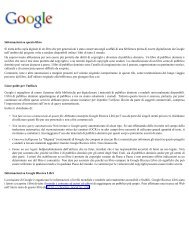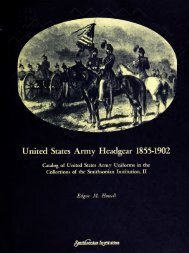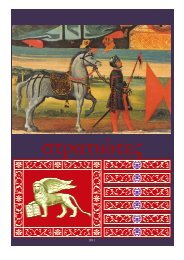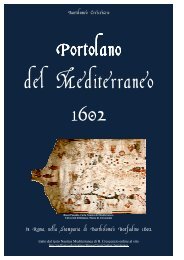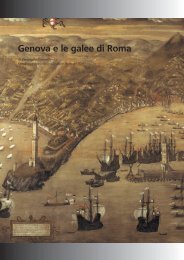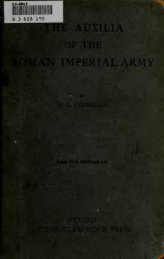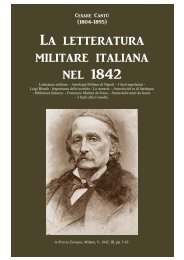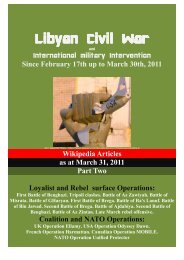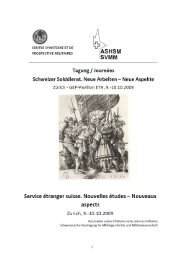A bibliography of English military books up to 1642 and of ...
A bibliography of English military books up to 1642 and of ...
A bibliography of English military books up to 1642 and of ...
You also want an ePaper? Increase the reach of your titles
YUMPU automatically turns print PDFs into web optimized ePapers that Google loves.
'<br />
CopUs. B.M. i<br />
Bod.<br />
Contents. This book had two edi<strong>to</strong>rs—Hayward, <strong>and</strong> Sir Peter Manwood,<br />
who owned the MS. <strong>and</strong> had formerly lent it <strong>to</strong> Grims<strong>to</strong>ne [v. No. 80].<br />
The plan <strong>of</strong> it leads one <strong>to</strong> conclude that this is merely a fragment ;<br />
" but<br />
whether the residue was never written, or whether it be perished, or whether<br />
it resteth in any other h<strong>and</strong>," says Hayward, " I remain doubtful." It<br />
came <strong>to</strong> him "in a ragged h<strong>and</strong>, <strong>and</strong> much maimed, both in sense <strong>and</strong> in<br />
phrase." Having res<strong>to</strong>red it as nearly as he could <strong>to</strong> the style <strong>and</strong> meaning<br />
<strong>of</strong> the author, he <strong>and</strong> Manwood caused it <strong>to</strong> be published in the hope <strong>of</strong><br />
drawing in<strong>to</strong> light the residue, if there were any extant. Pp. 1-56 treat <strong>of</strong><br />
the beginning <strong>of</strong> the troubles in the Netherl<strong>and</strong>s, much <strong>of</strong> the information<br />
contained therein having been given <strong>to</strong> the author by William <strong>of</strong> Orange.<br />
P. 56 chronicles the arrival at Flushing in June, 1572, <strong>of</strong> Capt. Thomas<br />
Morgan with 300 <strong>English</strong>men, among whom was Williams himself. This<br />
was the first b<strong>and</strong> <strong>of</strong> British <strong>to</strong> serve the Low Countries against Spain. Previously,<br />
though there had been a considerable number <strong>of</strong> <strong>English</strong>men taking<br />
part in these wars, they were chiefly gentlemen, serving independently.<br />
Morgan's b<strong>and</strong> was reinforced, in the autumn, by a regiment 1,500 strong,<br />
under the colonelcy <strong>of</strong> Sir Humfrey Gilbert, who, however, returned with<br />
most <strong>of</strong> his men <strong>to</strong> Engl<strong>and</strong> before the year was out. Another regiment<br />
was raised by Morgan in February, 1573; but, a year later, this, <strong>to</strong>o, returned<br />
home, the <strong>of</strong>ficers<br />
their pay.<br />
in Engl<strong>and</strong>.<br />
having quarrelled with the Prince <strong>of</strong> Orange over<br />
Morgan's Regiment it was that established the use <strong>of</strong> the musket<br />
Williams, eager " <strong>to</strong> see strange wars," soon returned <strong>to</strong> the Continent,<br />
where he joined Romero's army, <strong>and</strong> fought on the Spanish side in the naval<br />
battle <strong>of</strong>f Middelburgh ; at which point the narrative terminates. Williams<br />
excuses his defection on the ground that his sovereign was not at that time at<br />
war with Spain ; but later on he returned <strong>to</strong> the service <strong>of</strong> his first masters,<br />
the States. The yielding <strong>up</strong> <strong>of</strong> Sluys * <strong>to</strong> Spain, in July, 1587, occasioned a<br />
great clamour in Engl<strong>and</strong>, <strong>and</strong> Williams reaped his full share <strong>of</strong> blame, his<br />
reputation as a brave <strong>and</strong> experienced soldier enabling him, however, <strong>to</strong> with-<br />
st<strong>and</strong> all attacks. In 1589, he <strong>to</strong>ok part in the expedition <strong>of</strong> Drake <strong>and</strong><br />
Norris <strong>to</strong> Lisbon. In 1590, we find him in the service <strong>of</strong> Henry IV. <strong>of</strong><br />
France j but falling in<strong>to</strong> disfavour with that king, he wrote <strong>to</strong> Burleigh for<br />
a passport <strong>to</strong> enter in<strong>to</strong> the service <strong>of</strong> another prince.* However, the<br />
^<br />
MSS. Cott. Galba, c. ix. 102 ; D. i. 40, 175, 179 <strong>and</strong> 214. These letters refer<br />
<strong>to</strong> the defence <strong>and</strong> surrender <strong>of</strong> Sluys. Williams gives an account <strong>of</strong> this siege in the<br />
"Brief Discourse" [No. 45]; <strong>and</strong> adds that he intends writing more fully <strong>of</strong> the<br />
matter in his "discourse <strong>of</strong> the Netherl<strong>and</strong>ers' a6tions"—a pro<strong>of</strong> that the latter work,<br />
as it st<strong>and</strong>s, is incomplete. Grims<strong>to</strong>ne transfers the account in<strong>to</strong> his His<strong>to</strong>ry [No.<br />
80], under date 1587.<br />
'<br />
MSS. Harl. 6995. 50; MSS. S<strong>to</strong>we, 132. f. 112 j MSS. Harl. ,1579.<br />
76



